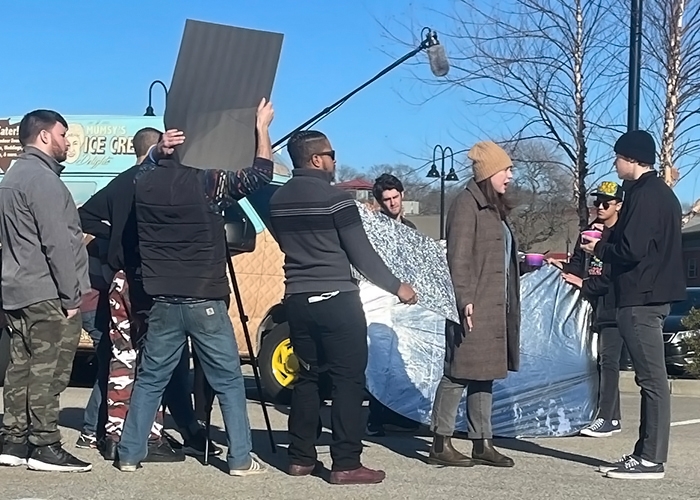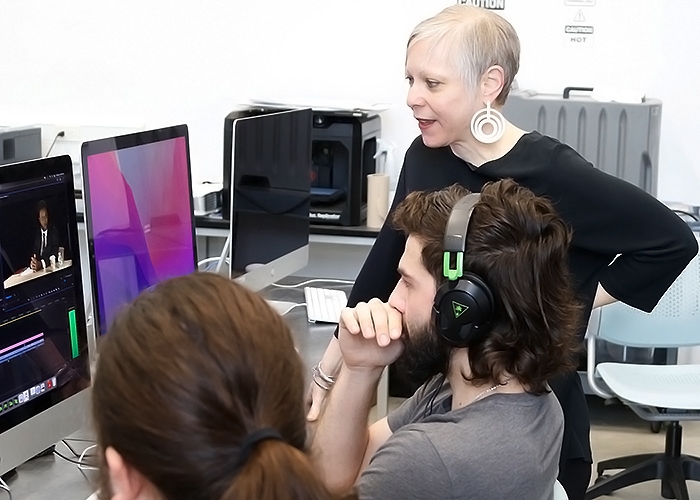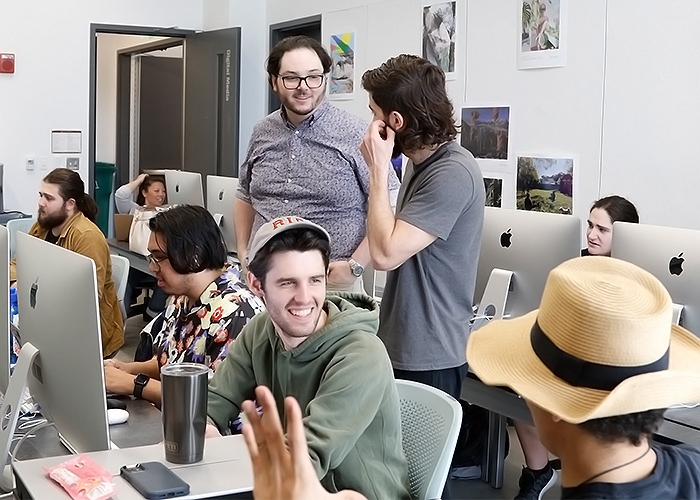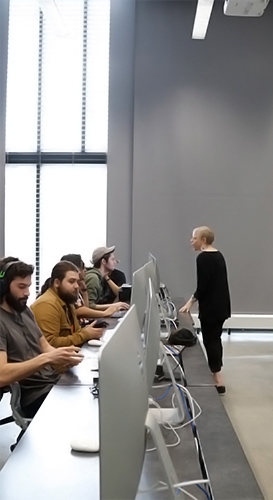“Endings” – The First Full-Length Feature Film by RIC Students
- News & Events
- News
- “Endings” – The First Full-Length Feature Film by RIC Students

Meet the writers/directors of “Endings” (from left) Angelica DiMaio, Emily Daltorio and Greg Jason. “Endings” premiered on May 5 and is now streaming on YouTube.
It’s not unusual for RIC film majors to produce their own short films or intern for independent and Hollywood film directors, but they’ve never written, directed and produced a full-length movie of their own … not until now.
Starring five actors from RIC’s award-winning theatre program, RIC film studies students spent the academic year creating “Endings,” a full-length feature film that premieres on Friday, May 5, at 7 p.m. in Gaige 100. The screening is free and open to the public and is also available for viewing on the RIC Film Studies YouTube Channel.
“Endings” tells three interconnected stories (each running about 15 to 20 minutes) about characters dealing with different kinds of endings. The first story, “Show Me How to Live,” by senior Angelica DiMaio, focuses on the loss of a long-term romantic partner. The second story, “Growth Spurt,” by sophomore Emily Daltorio, is about two friends facing the end of high school; one wants to hold onto the past and the other is looking forward to the future. The third story, “Politics are Falling Apart,” by senior Greg Jason, covers a televised political debate that goes completely off the rails.

The writers not only wrote their own scripts, they directed their segment of the film and assisted in the production. DiMaio was director of cinematography for Daltorio. Daltorio worked on sound/audio for DiMaio. And Jason jumped around and did a little bit of everything for everyone.
“That was the best part,” he says, “just helping out in any way I could and getting to know the different roles in making a film.”
“Endings” is the result of a pilot course titled FILM 374: Advanced Narrative Filmmaking.
“It was created at our students request,” explains Assistant Professor of English and Film Studies Rosalind Sibielski ’97. “Typically, every summer, production companies come to Rhode Island to shoot on location, and often our students are able to intern on their sets. But for many students, internships on longer projects are not an option. RIC students often work multiple jobs in addition to going to school. This pilot, which we intend to make a permanent course, is a way to provide students with an internship-like experience on a full-length film.”

The project began with FILM 372: Movie Pre-Production in the Fall Semester. In this course, students spent the first half of the semester writing their own individual scripts about a common theme – endings. Then a faculty panel reviewed the scripts and selected the three to be used in the full-length feature film. The second half of the semester was spent in pre-production work.
“I didn’t think my script would be picked,” DiMaio admits, “because I didn’t think it was my best work. But once we got into production, I got input from the production crew that helped me tweak my script and realize my vision.”
Full-on production work began this Spring Semester in the pilot course FILM 374, taught by adjunct faculty member Neal Mercier. Working alongside his students were first-year students from the introductory course FILM 218 taught by Sibielski. All first-year students were production assistants on the project, giving them the opportunity to try on different hats and start thinking about which area of filmmaking they’d like to specialize in.

Other partners in this project were RIC’s theatre program and the Multimedia Production Studio.
“Assistant Professor of Theater Casey Seymour Kim was amazing in helping us cast this film,” Sibielski says. “Michael Dade, who is in technical theatre, helped us find our fabulous hair and makeup artist; and Melissa Mendenciy, manager of the Multimedia Production Studio, lent us equipment, while her students helped us film one of the scenes. They’ve been very generous, very enthusiastic and a great support to our students.”
The biggest takeaway from this experience for Daltorio and Jason was being able to apply what they learned in class to a real-world experience. DiMaio’s takeaways came from the act of writing her script. She learned how important it is to trust her own voice, she says.

“It’s been so exciting to see the work of these students,” Sibielski remarks. “Neal and I really stepped back and let the students take over. We were there to provide guidance and help with technical problems, but otherwise, this was their project.”
“It’s been great to see them come into their own as filmmakers,” she says. “Unlike a class assignment, where there is a tendency to defer to the instructor and be worried about meeting the assignment requirements, they’ve really taken this project and made it their own.”
DiMaio and Daltorio hope to make screenwriting and directing a career, while Jason would like to work in all areas of filmmaking. His ultimate dream is to be a stuntman.
When asked how viable it is to make the field of filmmaking a career, Sibielski replies, “If the pandemic has taught us anything, it’s taught us we need entertainment. Because of all the streaming platforms, filmmaking is a career that is accessible to a larger number of people. Our students love movies, they love talking about movies, they love making movies and this is a career that will allow them to turn that into a way to support themselves.”

Rhode Island College’s Film Studies Program offers two tracks – the film studies track and the film production track. Most students are in the production track.
Both tracks require students to take at least two introductory courses in the other track. “If you’re making films, you need to know the history of filmmaking, and if you’re going to be a film critic, scholar, archivist or historian you need to know how movies are made,” Sibielski says.
Once students choose a track, they decide on a specialization of which there are many, including screenwriting, directing, cinematography, editing and sound engineer.
Rhode Island College’s Film Studies Program was ranked 12th Best in the Country by Intelligent.com and ranked among the Top 15 Best Affordable Film Studies Degree Programs (Bachelor’s) in the country by Affordable Schools.net. Visit the Film Studies Program website to find out more.
